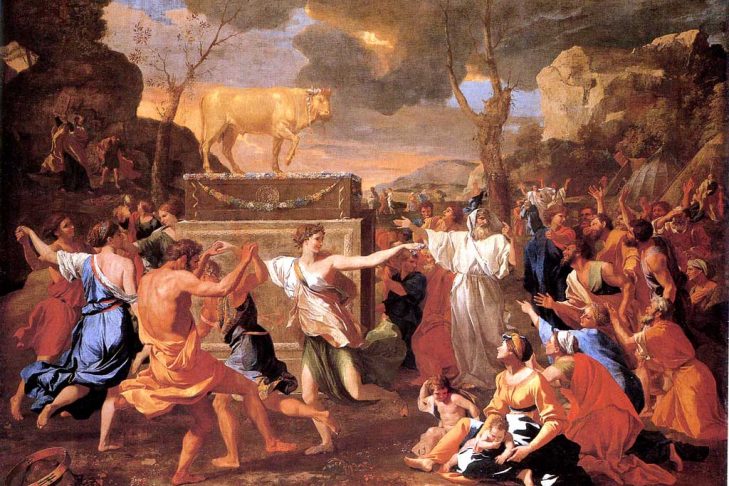Parashah Re’eh has a lot to say about idolatry. God says He will curse those who “turn away from the path that I enjoin upon you this day and follow other gods. You must destroy all the sites at which the nations you are to dispossess worshiped other gods…. They perform for their gods every abhorrent act that the Lord detests, they even offer up their sons and daughters in fire to their gods…tear down their altars, smash their pillars, put their sacred posts to the fire, and cut down the images of their gods, obliterating their name from that site….” And so on; it comes up several more times in this parashah and, of course, in the Tanach (Jewish scripture including the Torah, the Neviim/Prophets and the Ketuvim/Writings).
Let’s do a little “what if?” game. What if we did worship other gods? How would we keep track? Would we need a godtracker.com? How would we choose which to worship? Here’s a sampling of the many choices.
If I were inclined to worship another god, it might be Gelos, the Greek god of the spirit of laughter. Komos was the Greek god of revelry and merrymaking, so we can assume that those two partied together. The Canaanites had Yam, god of the sea and the river, Sykyk, god of justice, as well as Shamahyim, god of the heavens. The Hittites had the goddess Ishtar, of which all we know is that a movie by that name almost brought about Hollywood’s Armageddon. The Latvian goddess of the sun, Saule, was also a goddess of fertility and, you have to like this, of the unlucky. The Philistine fish god Dagon, who was worshipped as a fertility god, is mentioned in the Tanach as having temples in Ashdod and Gaza.
As we are well aware, the Egyptians worshiped many gods, including Babi, the god of baboons, and Sobek, the god of crocodiles. On the other hand, there was the Egyptian sun goddess Bastet, represented by a woman with the head of a cat, and cats were considered sacred. OK, maybe they had a point there. There have been thousands of gods worshipped by various religions and civilizations. I toyed with the idea of making up some gods, but all I came up with was Dunkin’ Deus, the god of coffee and donuts. I suggested to my son that we could name a god of pets, but he said, “Pets are gods.” True. And let’s face it, one God is easier to keep track of.
Looking back at Exodus, I think that when God hardened Pharaoh’s heart as Egypt slogged through the 10 plagues and Pharaoh kept breaking his promise to let the people go, this was God’s way of asserting, to paraphrase the great Chevy Chase, “I’m God and you’re not.” The Israelites, having been slaves, steeped in Egyptian culture for centuries, perhaps had to be weaned away from thinking that Pharaoh, who himself was an Egyptian god, was The God. Pharaohs were considered one of the more important of all the Egyptian gods. While a pharaoh was ruling, he took on the incarnation of the god Horus and the son of Re. Once the pharaoh died, he was identified with the god Osiris, the god of the underworld. Eventually the Israelites got the message. However, they had relapses.
The Talmudic tractate Avodah Zarah is devoted to laws against idolatry and the attendant practices. One of the stories told is that Jewish elders in Rome were asked why God doesn’t just destroy idols if he hates them so much. The response: men worship the sun, moon and stars, and God refused to destroy the world He created “because of fools.”
Elsewhere in the Talmud we read that although the intention to commit a sin doesn’t count as a sin, this is not the case with idolatry. Even the intention to worship idols is a sin. Another Talmudic commentary states, “Whoever endorses idolatry, rejects the entire Torah; and whoever renounces idolatry, accepts the entire Torah.”
Many of the commandments in the Torah repudiate the practices of pagans who lived among the Israelites, including the Canaanites, Mesopotamians and Egyptians. Well into the prophetic period, there was a continuing struggle against idol worship. The prophet Hosea strongly criticized the cult of Baal. The most thorough cultic purge in the history of Israel took place during the reign of King Hezekiah, which is thought to have been from 715 to about 686 BCE. The prophet Jeremiah complained: “According to the number of thy cities are thy gods, O Judah.” Such teachings helped to strengthen Jews when confronted with such ogres as the idol worshipper Antiochus, the villain of the Chanukah story.
Among the reasons that idolatry is forbidden is because it violates the Covenant and because it is, as one scholar explains, useless. Various peoples and some Israelites believed that fertility, rain and health, among other things, could be controlled by recourse to other gods or by worship of their images, something of which the prophet Hosea spoke. But since, according to the Torah, God is in control of these phenomena, idolatry is useless.
While the various cultic practices might seem foreign or even weird to us, we should be mindful that human nature doesn’t change—only the technology does. We struggle with the same weaknesses and impulses our forebears did. Have you ever wondered if you were trudging through the desert for 40 years if you wouldn’t complain about the food, the water, the shlep? Maybe even ask Aaron to construct a god you could see? Struggling with this history and these ideas can keep us from being complacent about who we were, who we are, what we do and where we’re going.
To some extent, the battle against idolatry faded into the background of Judaic thought during the period of the Second Temple. Temples dedicated to Mesopotamian and Babylonian gods were no longer considered significant threats to the Hebrews’ religion.
However, Maimonides, who lived in relatively modern times, between 1135-1204 C.E., felt the need to restate biblical injunctions against idolatry. He was concerned that some Jews were influenced by anthropomorphic conceptions of God then popular in European Christianity. Maimonides responded with his 13 principles of Jewish faith, which include: The Creator is the Creator and Guide for all created beings. He alone made, makes, and will make all that is created. The Creator is a Unity, and there is no union in any way like Him. He alone is our God, who was, who is, and who is to be. The Creator is not a body, is not affected by physical matter, and nothing whatsoever can compare to God or be compared with God.
I’d like to end with some insights from Rabbi David Wolpe, who suggests that idolatry was about giving ourselves too little credit. He quotes Abraham Joshua Heschel, who said that idols are forbidden because there already exists an image of God in this world: it is found in every human being. Therefore, there is only one medium in which one may fashion an image of God, and that is the medium of one’s life. To create an idol of wood or stone and to call it God is less an insult to God than it is an insult to ourselves, to human dignity. The message of the Torah is to make oneself a worthy image of God, and not to seek images of God in that which we create. Rabbi Wolpe also quotes Rabbi Akiva, who taught that God’s love is manifested not only in that we were made in His image, but that God told us that we were made in His image. So, why create idols? Instead, we learn to see each other as individual sparks of the One who made us all.
This post has been contributed by a third party. The opinions, facts and any media content are presented solely by the author, and JewishBoston assumes no responsibility for them. Want to add your voice to the conversation? Publish your own post here. MORE



